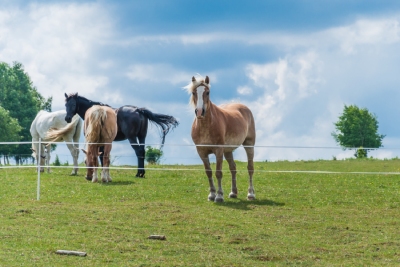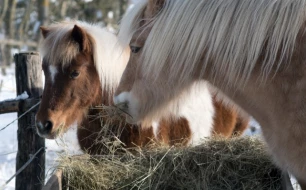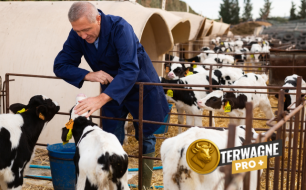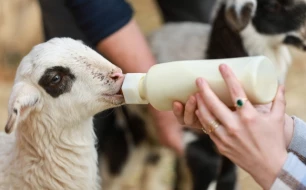The prevention of laminitis in horses relies on a rigorous management of grazing. To avoid this painful condition, it is crucial to control access to grass, especially in the spring. Terwagne, a specialist in breeding equipment, shows you how to prevent laminitis with adapted accessories like fencing posts for grazing rotation.
What is laminitis in horses?
 Laminitis is a serious hoof condition that can cause severe pain and, in the most severe cases, significant lameness. It results from an inflammation of the tissues connecting the hoof to the foot bone. This inflammation is often caused by dietary overload, excess carbohydrates, metabolic imbalance, or even too sudden access to fresh and rich grass, particularly in spring.
Laminitis is a serious hoof condition that can cause severe pain and, in the most severe cases, significant lameness. It results from an inflammation of the tissues connecting the hoof to the foot bone. This inflammation is often caused by dietary overload, excess carbohydrates, metabolic imbalance, or even too sudden access to fresh and rich grass, particularly in spring.
The consequences can be very severe, potentially leading to the animal's death if the condition is not addressed promptly or adequately.
Among the most common symptoms, you may notice that your horse adopts an analgesic posture, has difficulty moving, lies down more often, and shows signs in the foot area (heat, pain). An increased heart rate can also be a warning sign.
How to prevent laminitis in horses? Pasture management
Preventing laminitis begins with careful pasture management. Young grass, rich in sugars, can trigger a crisis in sensitive or overweight horses. It is therefore essential to introduce your horse gradually to pasture.
To do this, set up a rotational grazing system. Segment your land with appropriate fences and vary grazing and resting periods. This will allow the grass to regenerate while regulating nutrient intake.
Mobile fences are particularly effective for this management: using stakes, you can easily adjust the area accessible to your horses. This way, you control their access to the grass and significantly reduce the risks of dietary overload, and therefore laminitis.
Simple to install and economical, this solution is ideal for a rational management of your pastures.
Anti-laminitis horse muzzle: limiting grass intake
In addition to rotational grazing, you can use an anti-laminitis muzzle. This type of muzzle limits the amount of grass ingested while allowing your horse to graze at its own pace. Ideal for greedy or sensitive equines, the muzzle basket is highly recommended by professionals for preventing laminitis.
Dietary supplements: natural anti-laminitis care for horses
Finally, to support your horse's body, consider dietary supplements, which can play a key role in the prevention and treatment of laminitis in horses. Products like Hepa’Clean, Métabo’Light, or Drenalis support metabolism and promote the elimination of toxins, thus reducing risk factors.
Available at Terwagne, these natural solutions fit perfectly into a comprehensive pasture management and horse health strategy.
Do you want to know more about our accessories and care to prevent laminitis in horses?
The Terwagne team is available to answer all your questions. Contact us now via our online form or by phone.


 Laminitis is a serious hoof condition that can cause severe pain and, in the most severe cases, significant lameness. It results from an inflammation of the tissues connecting the hoof to the foot bone. This inflammation is often caused by dietary overload, excess carbohydrates, metabolic imbalance, or even too sudden access to fresh and rich grass, particularly in spring.
Laminitis is a serious hoof condition that can cause severe pain and, in the most severe cases, significant lameness. It results from an inflammation of the tissues connecting the hoof to the foot bone. This inflammation is often caused by dietary overload, excess carbohydrates, metabolic imbalance, or even too sudden access to fresh and rich grass, particularly in spring.



